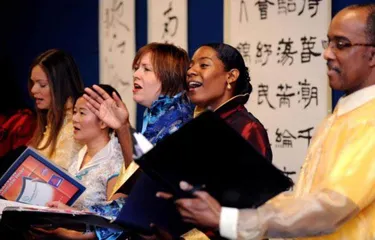Creating a New Era for Global Civilization Development by Deepening Exchanges and Mutual Learning
作者: Li Yuan

On March 15, 2023, General Secretary Xi Jinping proposed for the first time the Global Civilization Initiative (GCI) at the CPC in Dialogue with World Political Parties High-level Meeting. The GCI, like the Global Development Initiative and the Global Security Initiative, is another important public good provided by China in the new era to address common global challenges and build a shared future for humanity. This year marks the tenth anniversary of General Secretary Xi Jinping’s proposal of building a community with a shared future for mankind and the Belt and Road Initiative (BRI). The GCI has further expanded the means and pathways towards the building of a community with a shared future for mankind, enriched the ideological connotation of the BRI, and offered Chinese solutions and contributed Chinese wisdom to promoting the exchanges and mutual learning of civilizations as well as advancing progress of human civilization.
In recent years, the international landscape has been undergoing profound changes. The various conflicts among different cultures and civilizations have not yet been eliminated, and noises hyping up the notions such as superiority of certain civilizations and clash of civilizations have been lingering in the international public opinion arena. However, in the east of world, China in the new era has been exploring ways of interaction among nations and civilizations with its unique cultural spirit. With the continuous development of Chinese modernization, China has forged its own unique vision on civilizations. General Secretary Xi Jinping pointed out at the CPC in Dialogue with World Political Parties High-level Meeting that “As the future of all countries are closely connected, tolerance, coexistence, exchanges and mutual learning among different civilizations play an irreplaceable role in advancing humanity’s modernization process and making the garden of world civilizations flourish.” Based on the features of the times and the development context of China, the GCI encapsulates the Chinese wisdom of state governance in the new era, follows the trend of world modernization and the law of human civilization development. With the GCI in mind, China will join hands with all countries to create a new era for global civilization cooperation through exchanges and mutual learning among civilizations.
Diversity of civilizations is a Necessary Law of the Development of Human History
Human history is one of plural civilizations prospering together in diversity. Interaction, collison and integration of different civilizations have brought about possibilities for progess of human society and painted a colorful picture of the world moving forward. As early as remote antiquity, human beings created a variety of colorful original civilizations, including, among others, the Mesopotamia civilization, the Nile River Valley civilization, the Indus Valley civilization, the Yellow River and Yangtze River civilization, the Maya civilization, which all brimmed with unique splendors. 2000 years ago, Confucius and Lao-tzu in China, Socrates and Plato in ancient Greece and other great thinkers emerged, who were just like bright stars shining together and became high mountains that later generations look up to. The ideological propositions and ethical principles they put forward created cultural traditions of different ancient civilizations and jointly lit up the sparks of the age of reason in human civilization.
With the opening of new trade routes, individuals from different civilizations set foot on each other’s territory more frequently. The exchanges and cooperation among civilizations gave impetus to the progress of human society. The four great inventions of China were transmitted to Europe via the Arab world, which promoted the Renaissance and the religious reform and facilitated the emancipation of mind and social progress in Europe; Zheng He made seven voyages by his treasure-loaded ship to the Western seas and spread advanced technologies to the South Seas, which led to civilization and enlightenment of local communities; Matteo Ricci and Xu Guangqi jointly translated the Elementorum by Euclid, which marked the beginning of the exchanges between Chinese and Western science. It can be seen that the exchanges and mutual learning of civilizations served as a basic form of human social interaction in history, and has great significance for the common prosperity of human civilizations. Connectivity between regional civilizations and inclusion of global civilizations have provided an inexhaustible source of nutrients for the emergence of new philosophies and new ideas, pushing for the continued development of human civilizations in all forms.
However, the industrial revolution has led to rapid changes in balance of power between countries. With the expansion of colonialism, the diversity of world civilizations has been severely challenged. After two world wars, the world established the basic order and rules for international relations and entered a period based on independent nation states. After more than a hundred years of endeavors, a vast number of developing countries have finally embarked on their own modernization paths, and the collective rise of diverse groups has become an inevitable trend of world development. Consequently, many ancient civilizations have regained their vitality and confidence, bringing the world civilizations back to the track of diversified and inclusive development featuring open dialogue, mutual learning and drawing on each other’s strengths. The diversity of human civilizations is bound to reappear, and the relations among civilizations are bound to return to equality. This is the general trend of human historical development and the aspiration of the people. General Secretary Xi Jinping stressed in the GCI that “We advocate the respect for the diversity of civilizations. Countries need to uphold the principles of equality, mutual learning, dialogue and inclusiveness among civilizations, and let cultural exchanges transcend estrangement, mutual learning transcend clashes, and coexistence transcend feelings of superiority.” China in the new era, guided by the vision of equality, mutual learning, dialogue and inclusiveness among different civilizations, has become a practitioner and promoter of global civilization exchanges and mutual learning, contributing Chinese wisdom and Chinese strength to promoting diversity, coexistence and development of human civilizations.